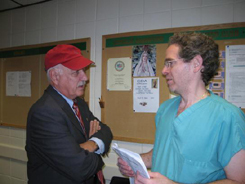
Did you know that prostate cancer is the second leading cause of cancer deaths among men in the United States, after lung cancer?
Prostate cancer is cancer that forms in tissues of the prostate (a gland in the male reproductive system found below the bladder and in front of the rectum). Prostate cancer usually occurs in older men and is the most common form of cancer in men (other than some forms of skin cancer). September has been set apart as Prostate Cancer Awareness Month.
Causes and Prevention of Prostate Cancer
Medical experts do not know what causes prostate cancer or how to prevent prostate cancer, but they are studying many factors. While all men are at risk for prostate cancer, some factors increase risk:
- Age. The older a man is, the greater his risk for getting prostate cancer.
- Family history. A man with a father, brother, or son who has had prostate cancer is two to three times more likely to develop the disease himself.
- Race and ethnicity. Prostate cancer is more common in some racial and ethnic groups than in others. Prostate cancer is more common in African-American men than in white men. It is less common in Hispanic, Asian, Pacific Islander, and Native American men than in white men.
Some prostate cancers become a serious threat to health by growing quickly, spreading beyond the prostate gland to other parts of the body, and causing death. Other prostate cancers grow slowly and never become a serious threat to health or affect how long a man lives.
Screening for Prostate Cancer

The main screening tools for prostate cancer are the digital rectal examination (DRE) and the prostate-specific antigen (PSA) test. The DRE and PSA tests cannot tell if you have cancer; they can only suggest the need for further tests. Evidence is mixed about whether early detection improves health outcomes.
Some medical experts believe all men should be offered regular screening tests for prostate cancer. Other medical experts do not. Given the uncertainty about the benefit of screening, CDC supports informed decision making about screening. When a man understands the nature and risks of prostate cancer and the risks, benefits, and alternatives to screening, he can make a decision consistent with his preferences and values.
Should I Get Screened for Prostate Cancer?
Not all medical experts agree that screening for prostate cancer will save lives. Currently, there is not enough evidence to decide if the potential benefits of prostate cancer screening outweigh the potential risks.
Potential benefits of prostate cancer screening include—
- Screening can detect cancers early.
- Treatment for prostate cancer may be more effective when it is found early.
Potential risks of prostate cancer screening include—
- False positive test results (indicating that you have prostate cancer when in fact you do not) that lead to further tests and can cause anxiety.
- Treatment of some prostate cancers that may have never affected a man's health even if left untreated.
- Treatment may lead to serious side effects such as impotence (inability to keep an erection) and incontinence (inability to control the flow of urine, resulting in leakage).
CDC and other federal agencies follow the prostate cancer screening guidelines set forth by the U.S. Preventive Services Task Force,![]() which state that there is insufficient evidence to recommend for or against routine screening for prostate cancer using PSA or DRE.
which state that there is insufficient evidence to recommend for or against routine screening for prostate cancer using PSA or DRE.
What if the Results of Prostate Screening Indicate Further Testing?
Do not panic. Most men who go for further testing do not have cancer. If your PSA test or DRE suggests a problem, your doctor most likely will refer you to a urologist (a doctor who has special training in prostate-related problems). Additional testing is necessary to determine if the problem is cancer or something else.
The urologist may perform a transrectal ultrasound — a small probe inserted into the rectum that bounces sound waves off the prostate, producing a video image. Transrectal ultrasound does not provide enough specific information to make it a good screening tool by itself, but some doctors find it useful as a follow up to a suspicious DRE or PSA test.
If the urologist suspects cancer, tiny samples of the prostate may be removed with a needle. This is called a biopsy. A biopsy is usually performed in the urologist’s office. The samples are examined under a microscope to determine if cancer cells are present.
What happens if prostate cancer is found?

No two men with prostate cancer are the same. Many factors affect the decision whether or not to treat the disease: the patient’s age, whether the cancer has spread, the presence of other medical conditions, and the patient’s overall health.
When prostate cancer has been found in its early stages and has not spread beyond the prostate, a doctor and his patient may decide upon:
- watchful waiting — monitoring the patient’s prostate cancer by performing the PSA test and DRE regularly, and treating it only if and when the prostate cancer causes symptoms or shows signs of growing;
- surgery (radical prostatectomy) — removing the prostate;
- external radiation therapy — destroying cancer cells by directing radiation at the prostate;
- internal radiation therapy (brachytherapy) — surgically placing small radioactive pellets inside or near the cancer to destroy cancer cells;
- hormone therapy — giving certain hormones to keep prostate cancer cells from growing;
- cryotherapy — placing a special probe inside or near the prostate cancer to freeze and destroy the cancer cells.
More advanced prostate cancers that have spread beyond the prostate can be complex to treat and may be incurable. Patients should discuss with their doctor the best course of action.
Educating Your Neighbors about Prostate Cancer
Many of your neighbors may benefit from a better understanding of Prostate Cancer it might even save their lives! The Prostate Cancer Awareness Month set aside in September is an excellent opportunity to organize a prostate cancer educational event for your community.
If an organized event is not reasonable, consider creating an educational display for your health center, community center, pool, club house, park, or wherever your neighbors congregate.
Neighborhood Link suggests the teaching tools below from the Centers for Disease Control and Prevention
These resources are produced by the Centers for Disease Control and Prevention and are therefore not bound by typical copyright laws and can be legally reprinted and used in your efforts to educate your neighbors.

Prostate Cancer Screening: A Decision Guide (PDF-118KB) is an easy-to-read booklet, organized in question and answer format, designed to help a man decide whether screening is right for him. The guide discusses the prostate, prostate cancer, and the available screening tests.

Prostate Cancer Screening: A Decision Guide for African Americans (PDF-155KB) targets African-American men. At all ages, African-American men die of prostate cancer more often than other men do. The reasons for the variation among groups are unknown, making it critical that African-American men know the facts about prostate cancer and the available screening tests.

La Detección del Cáncer de Próstata: Una Guía para Hispanos en los Estados Unidos (PDF-512KB) is 24-page booklet, written in Spanish, provides basic information and encourages Hispanic men to decide whether screening is the right choice for them.
 Print
Print Email
Email







